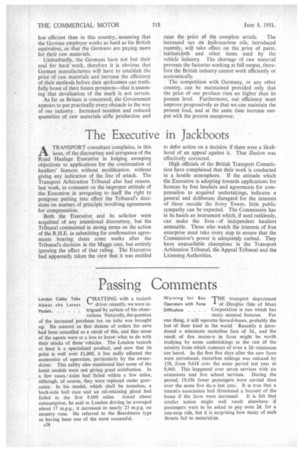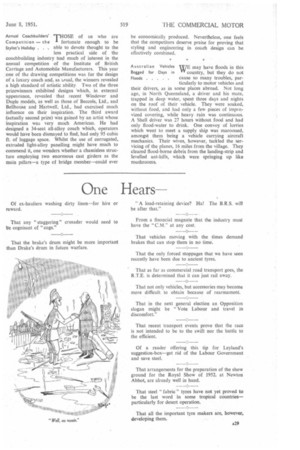Passing Comments
Page 30

Page 31

If you've noticed an error in this article please click here to report it so we can fix it.
London Cabby Talks CHATTING with a taxicab About the Latest driver recently, we were in Models trigued by certain of his obser
vations Naturally, the question of the increased purchase tax on cabs was brought up. He assured us that dozens of orders for cabs had been cancelled as a result of this, and that some of the agents were at a loss to know what to do with their stocks of these vehicles. The London taxicab at least is a specialized product, and now that its price is well over £1,000, it has sadly affected the economics of operation, particularly by the ownerdriver. This cabby also mentioned that some of the latest models were not giving great satisfaction. In a few eases,. axles had failed within a few miles, although, of course, they were replaced under guarantee. In his model, which shall be nameless, a back-axle ball race and an oil-retaining gland had failed in the first spoo miles. Asked about consumption, he said in London driving he averaged about 17 m.p.g.; it increased to nearly 23 m.p.g. on country runs. He referred to the Beardmore type as having been one of the most successful.
A28
Warning for Bus THE transport department
Operators with Fares ot Douglas (Isle of Man) Difficulties , Corporation is one which has many unusual features. For one thing, it still operates horsed-buses, probably the last of their kind in the world Recently it introduced a minimum motorbus fare of 3d., and the result of this increve in fares might be worth studying by some undertakings in the rest of the country from which rumours of even a 2d: minimum are heard. In the first five days after the new fares were introduced, motorbus mileage was reduced by 158, from 9,618 over the same period last year to 9,460. This happened over seven services with six extensions and five school services. During the period, 19,456 fewer passengers were carried than over the same five days last year. It is true that a tenant's association had threatened a boycott of the buses if the fares were increased. It is felt that similar action might well result elsewhere if passengers were to be asked to pay even 2(1. for a one-stop ride, but it is surprising how many of such threats fail to materialize. Annual CoachbuIlders' THOSE of us who are Competition — the A fortunate enough to be
Stylist's Holiday . . able to devote thought to the
less practical side of the coachbuilding industry find much of interest in the annual competition of the Institute of British Carriage and Automobile Manufacturers. This year one of the drawing competitions was for the design of a luxury coach and, as usual, the winners revealed a high standard of artistic ability. Two of the three prizewinners exhibited designs 'which, in external appearance, revealed that recent Windover and Duple models, as well as those of Beccols, Ltd., and Bellhouse and Hartwell, Ltd., had exercised much influence on their inspiration. The third award (actually second prize) was gained by an artist whose inspiration was very much American. He had designed a 34-seat all-alloy coach which, operators would have been dismayed to find, had only 95 cubic It, of luggage space. Whilst the use of corrugated, extruded light-alloy panelling might have much to commend it, one wonders whether a chassisless structure employing two enormous cast girders as the main pillars—a type of bridge member—could ever
be economically produced. Nevertheless, one feels that the competitors deserve praise for proving that styling and engineering in coach design can be effectively combined.
Australian Vehicles WE may have floods in this Bogged for Days in " country, but they do not Floods cause so many troubles, par ticularly to motor vehicles and their drivers, as in some places abroad. Not long ago, in North Queensland, a driver and his mate, trapped in deep water, spent three days and nights on the roof of their vehicle. They were soaked, without food, and had only a few pieces of improvized covering, while heavy rain was continuous. A Shell driver was 27 hours without food and had only flood-water to drink. One convoy of lorries which went to meet a supply ship was marooned, amongst them being a vehicle carrying aircraft mechanics. Their wives, however, tackled the servicing of the planes, 16 miles from the village. They cleared flood-borne debris from the landing-strip and levelled ant-hills, which were springing up like mushrooms.




















































































